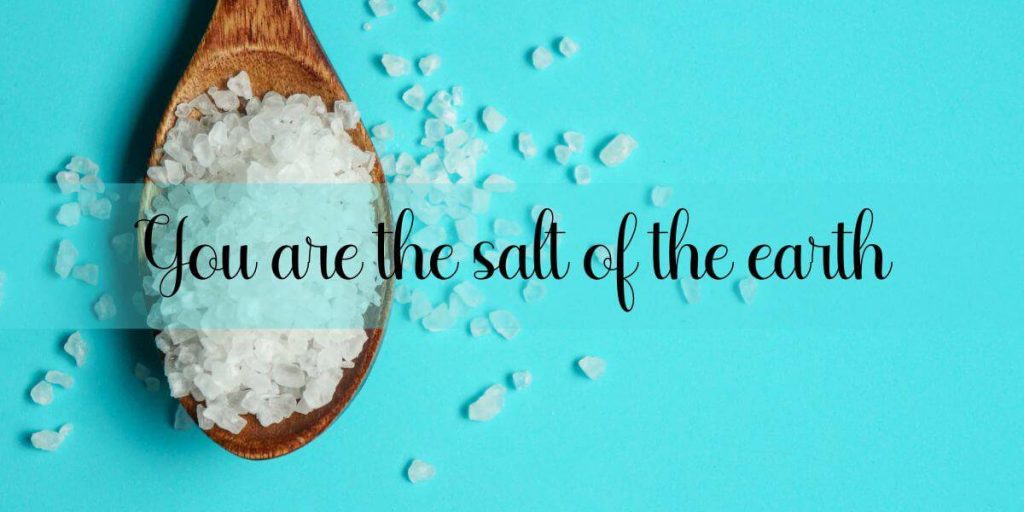salt has a powerful,
distinctive and at times overwhelming taste to it.
Salt
had long been a metaphor for
covenant faithfulness.
So, when God rescued the Hebrews from their
slavery in Egypt,
he made a covenant, a contract,
setting them apart
as his
own holy people
They were to be distinct from the other nations. They were to act different, look different and be different. They were to model a different way to live,
neither as slave nor slave driver,
defined by love for God and love of neighbor.
This is what Jesus is telling his disciples.
They are to offer a new way to be human that is not conformed to the destructive, violent and sinful patterns of this world.
We are to be a community defined by
self-sacrificial love modeled
upon the
cross of our messiah.
We are to be salt.
Yet, what happens when salt loses its saltiness?
It loses its distinctiveness and
purpose for being.
We may construct as many colossal monuments to our
own sectarian self-importance upon as many hills
as we like, but if we in no way stand distinct from the
destructive patterns of this world, then what’s the point?
We might as well keep our mouths shut
and our witness to ourselves
because our faith
“is no longer good for anything, except to be
thrown out and trampled underfoot.”
Yet at the time of Jesus, many contemporaneous
religious groups began to take the
idea of being salt to the extremes,
with some groups completely withdrawing from society.
They were distinct or “holy.”
But as Jesus makes clear, they were “holy”
to the point of worthlessness.
So, Jesus says in Matthew 5:14-15:
“You are the light of the world.
A city built on a hill cannot be hidden.
Neither do people
light a lamp and put it
under a bowl.
Instead, they put it on its stand,
and it gives light
to everyone in the house.”
Imagine the sublime power of a single candle piercing,
shattering the darkness of a pitch-black room.
Yet if you cover the candle up,
it goes dim.
What’s the point?
Sometimes religious people get so focused on holiness,
on separateness,
that we no longer have a viable,
credible witness
for our communities or the world.
We become so fearful of that which
is different,
of that which doesn’t
have a “Christian” label on it,
or of that which isn’t securely
within our “Christian”
neighborhoods and behind our “Christian”
walls.
We construct defenses, both ideological and concrete, to safeguard us from God’s beautiful world and the beautiful people living within it, beautiful people we have conditioned ourselves to fear and, at times, even hate.
As the followers of Jesus,
we are to be the light of the world.
So, we must not fear “the dark.”
It is imperative for us to
tear down the walls, to cross the barriers
and to be present and active in our neighborhoods and cities.
Having been
washed clean
once and for all by the death
and
resurrection of Jesus Christ,
we have no need
to fear being “contaminated”
by the so-called
“uncleanness” of our world.
We are called to fully embrace the other –
those not like us –
in love.
To be the light of the world is not to condemn,
withdraw or shy away from the world,
but to actively pursue the dark places, to willingly enter
into places of pain,
poverty, injustice, sickness, violence and sin.
We do this in imitation of Christ
in order
to bring the light, love, justice and
peace of God
to those people and places where it is
needed the most.
As followers of Jesus,
this is our mission. This is our witness.
Finally, in Matthew 5:16, Jesus states:
“In the same way, let your light shine before others, that they may see your good deeds and glorify your Father in heaven.”
Most simply, we are to
hear the words of Jesus and put them into practice.
Our salt, therefore, stays salty only so long as we practice the good deeds we do in imitation of Christ – shining the light of God in and among our community and before the watching world.

 RSS Feed
RSS Feed
























































